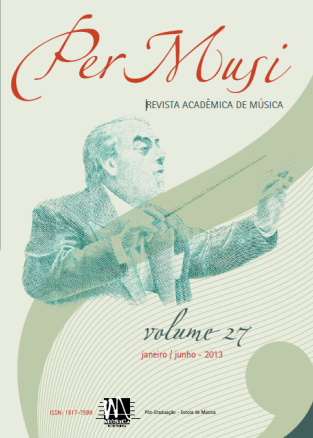O Piano Complementar na formação acadêmica
concepções pedagógicas e perspectivas de interdisciplinaridade
Palavras-chave:
Piano complementar, Abordagem interdisciplinar em música, Apreciação, Performance e criação, Formação acadêmica, Proposta pedagógica na músicaResumo
Estudo sobre fundamentos para que a abordagem interdisciplinar do Piano Complementar possa promover a integração entre domínios diversos da formação acadêmica, no bacharelado e na licenciatura. São discutidas as vantagens da articulação pedagógica entre a apreciação, a performance e a criação, com a contextualização de aspectos inerentes ao ensino e ao desenvolvimento musical. As particularidades dos diversos perfis dos alunos da graduação, bem como suas necessidades e semelhanças, são subsídios para observações sobre a interface entre as disciplinas, a compreensão musical e conexões entre a prática no instrumento e a percepção da música. As concepções de alguns pianistas e professores são também tratadas e diretamente correlacionadas com a prática e a reflexão sobre a música e o ensino musical.
Referências
ALTENMULLER, E. O.Acordes na Cabeça,Revista Viver Mente&Cérebro, www.vivermentecerebro.com.br, outubro, 2004.
ARBARETAZ, M. C. Lirela Musique par laConnaissancedesIntervalles, vol I e II. Paris: ChappelEditeurs de Musique, 1979.
BERKOWITZ, S., FONTRIER, G. e KRAFT, L. A New Approach to Sight Singing. New York: W. W. Norton &Company, 1976.
CAMPOS, M. C. A Educação Musical e o Novo Paradigma. Rio de Janeiro: Enelivros, 2000.
CAVAZOTTI, A. e GANDELMAN, S. Uma Entrevista com Janet Schmalfeldt. PER MUSI, v. 5.Belo Horizonte: Escola de Música da UFMG, p.55-67, 2002.
DOBBS, DavidReflexo Revelador,RevistaMente&Cérebro,www. mentecerebro.com.br, junho, 2006.
ESTRELLA A. A. Em Torno de Estudos Pianísticos. Tese de concurso para provimento da cadeira de piano, da Escola Nacional de Música da Universidade do Brasil. Rio de Janeiro: Jornal do Commercio - Rodrigues & C., 1941.
FOLDES, A. Segredos do teclado - livro dos pianistas. Fernando Lopes Graça. (trad.); Lisboa: Valentim de Carvalho Ltda: 1949.
GAINZA, V. H. Mètodo para Piano - introducción a la música. Buenos Aires: Barry Editorial, 1976.
___________Fundamentos materiales y técnicas de laeducacion musical. Buenos Aires: Ricordi, 1969.
___________ La iniciacion musical del nino. Buenos Aires: Ricordi, 1964.
___________ Estudos de Psicopedagogia Musical. São Paulo: Summus, 1988.
___________ (ed.) Nuevas Perspectivas de laEducacion Musical. Buenos Aires: Editorial Guadalupe, 1990.
GALHOZ, M. A. D. Fernando Pessoa - Obra Poética – organização, introdução e notas. Rio de Janeiro: Editora José Aguilar Ltda, 1960.
GARDNER, Howard. Estruturas da Mente A Teoria das Inteligências Múltiplas. Sandra Costa (trad.); Porto Alegre: Artes Médicas do Sul, 1994.
GIESEKING W. - LEIMER K. Como Devemos Estudar Piano. Tatiana Braunswieser (trad.);São Paulo: E. S. Mangione Edição “A Melodia”: 1950.
HAZAN, E. O Piano - Alguns Problemas e Possíveis Soluções. São Paulo: Irmãos Vitale, 1984.
HIGUCHI, M. K. K. Técnica e Expressividade - diversidade e complementaridade no aprendizado pianístico. Dissertação de Mestrado, Escola de Comunicações e Artes da Universidade de São Paulo (ECA/USP): 2003.
KAPLAN, J. A. Teoria da Aprendizagem Pianística. Porto Alegre; Editora Movimento, 1987.
KODAMA, M. K. Tocando com Concentração e Emoção. São Bernardo do Campo: M. KasueKodama, 2000.
LIMA, S. A. [org.] Peformance&Interpretação Musical – umaprática interdisciplinar. São Paulo: Musa Editora Ltda., 2006.
PAZ, E. A. 500 Canções Brasileiras. Rio de Janeiro: Luís Bogo Editor, 1989.
________ As Estruturas Modais na Música Folclórica Brasileira. Rio de Janeiro: UFRJ - Cadernos Didáticos, 1994.
________. Um Estudo Sobre as Correntes Pedagógico-Musicais Brasileiras.Rio de Janeiro: Cadernos Ditáticos UFRJ, 1992.
ROSEN, Charles. A Geração Romântica. São Paulo: Edusp - Editora da Universidade de São Paulo, 2000.
SCHNABEL, A. My life and Music. New York: Dover, p.121-141, 1988.
SWANWICK, K. A Basis for Music Education. London: Routledge, p 40-53, 1979.
___________ Ensinando Música Musicalmente. São Paulo: Moderna, 2004.
WAGNER, Jeffrey. Interview with Michel Block for Clavier Magazine: To Thine Own Self Be Ture, MaurícioVeloso (Trad.) [original não editado]
___________Passing on the Legacy - interview with Michel Block by Jeffrey Wagner, Clavier Magazine, vol 37, january 1998.
WEINBERGER, N. M. A Música e o Cérebro, Scientific American Brasil, www.sciam.com.br, 2004.
WIDMER, E. Ludus Brasiliensis – caderno I. São Paulo: Ricordi Brasileira,1967.
WILLEMS, E. Educacion Musical – Vol I. GuíaDidáctica para el Maestro. Buenos Aires: Ricordi Americana,1966.
___________. As Bases Psicológicas da Educação Musical. Suíça: Edições Pro-Musica, 1970.
___________. El valor humano de laeducacion musical. Buenos Aires: Paidos, 2002.
WISNIK, J. M. O Som e o Sentido - Uma outra história das músicas. São Paulo: Editora Schwarcz, 2001.
Downloads
Publicado
Edição
Seção
Licença

Este trabalho está licenciado sob uma licença Creative Commons Attribution 4.0 International License.

Exceto onde está indicado, o conteúdo neste site está sob uma Licença Creative Commons - Atribuição 4.0 Internacional.












